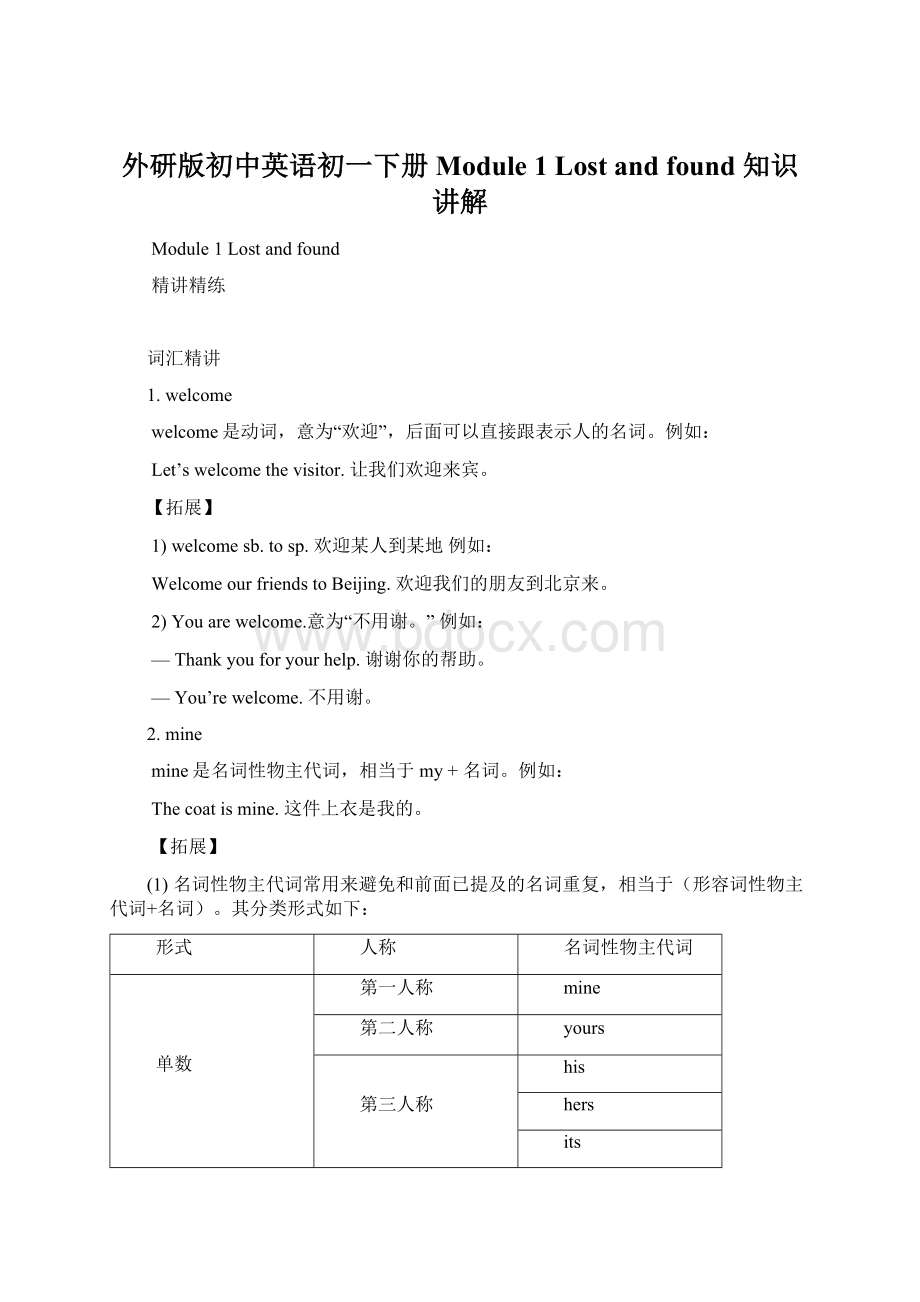外研版初中英语初一下册Module 1 Lost and found 知识讲解文档格式.docx
《外研版初中英语初一下册Module 1 Lost and found 知识讲解文档格式.docx》由会员分享,可在线阅读,更多相关《外研版初中英语初一下册Module 1 Lost and found 知识讲解文档格式.docx(14页珍藏版)》请在冰豆网上搜索。

hers
its
复数
ours
theirs
(2)名词性物主代词的用法:
I.名词性物主代词可用作主语、宾语和表语,可单独使用,其后不再跟名词。
1)用作主语。
Thatisn’tmycar.Mineisathome.那不是我的汽车。
我的汽车在家里。
2)用作宾语。
Ihavebrokenmypen.MayIuseyours?
我折断了我的钢笔。
我可以用一下你的吗?
(作动词的宾语)
Hewasn’tinmyroom.Hemightbeinhis.他不在我的房间。
他可能在自己的房间。
(作介词的宾语)
II.名词性物主代词可与介词of构成短语,用作后置定语,表示从属关系。
Jackisafriendofmine.Jack是我的一个朋友。
(用于双重所有格)
【注意】
1)在使用名词性物主代词时,必须有特定的语言环境,也就是要省略的名词大家已经知道,已经提起过。
Thereisabook.It’shers.那里有本书。
是她的。
2)名词性物主代词用作主语时,谓语动词的数应随其所指代的数而定。
—Isthispencilyoursorhers?
这支铅笔是你的还是她的?
—It’smine.Hersisinherbag.(Hers=Herpencil)是我的,她的铅笔在她的包里。
—Whosebooksarethese?
这些是谁的书?
—Theyarehis.Yoursareoverthere.(Yours=Yourbooks.)
是他的。
你的在那里。
3.talkto…
talkto意为“和……交谈”,talk作不及物动词,意为“讨论,交谈”。
Theteacheristalkingtothestudent.老师正在与这位学生交谈。
(1)与talk有关的词组:
talkaboutsth.谈论某事
talkwithsb.和某人交谈例如:
Theyaretalkingabouttheirhomework.他们正在谈论他们的作业。
I’dliketotalkwithyou.我想和你谈谈。
(2)talk;
speak;
tell与say的辨析
1)talk的意思是“谈话,谈论”,指相互之间的谈话,一般用作不及物动词,与介词to或with连用,表示“与……交谈”。
而谈及关于某人或某事时,后接介词of或about。
Theyaretalkingonthephone.他们正在电话中交谈。
Mymotheristalkingwithmyteacher.我妈妈正在和我的老师谈话。
WearetalkinginEnglish.我们正用英语交谈。
2)speak的意思是“说话”,作不及物动词时,通常指说话的能力和方式;
作及物动词时,其后的宾语为某种语言。
speaktosb.表示“同某人说话”。
Wouldyouliketospeakatthemeeting?
你要在会上发言吗?
BobspeaksChinesequitewell.Bob汉语说得相当好。
JoecanspeakalittleChinese.Joe能说一点儿汉语。
MayIspeaktoMr.Green?
我可以同格林先生通话吗?
(此句常用于打电话用语中)
HeisspeakingtoLily.他正在和Lily说话。
3)tell意为“讲述”“告诉”,作及物动词时,指把一件事或一个故事讲出来,有连续诉说之意。
如:
tellthetruth说实话;
tellastory讲故事。
tell也可接双宾语结构或复合宾语结构。
tellsb.sth.告诉某人某事;
tellsb.aboutsth.告诉某人关于某事;
tellsb.(not)todosth.告诉某人(不要)去做某事。
例如:
—Whatdidyourmothertellyoujustnow?
刚才你妈妈告诉你什么了?
—Shetoldmenottorideabikequickly.It’stoodangerous.
她告诉我不要快骑自行车,那太危险了。
Pleasetellmesomethingaboutyourself.
请告诉我关于你自己的一些事情。
4)say意为“说出”“说过”,强调说话的内容,也可与to连用,saytosb.意为“对某人说”。
Heoftensays“hello”tomewithasmile.他常笑着向我问好。
IcansayitinEnglish.我能用英语说它。
Hesaystome,“Ilikemyhometown.”他对我说:
“我喜欢我的家乡。
”
4.geton
geton意为“上车”,其反义词组为getoff。
Hegetsonthebusatthatstationeveryday.他每天在那个车站上公共汽车。
Don’tgetoffthebus.不要下公共汽车。
geton还可意为“进展”,getonwellwithsb.意为“与某人相处融洽”;
getonwellwithsth.意为“某事进展顺利”。
I’mgettingonwellwithmyclassmates.我和我的同学相处融洽。
Howareyougettingonwithyourwork?
你的工作进展如何?
5.inahurry
inahurry意为“匆匆忙忙地”,hurry此处用作名词。
Shedressedherselfinahurry.她匆忙穿好衣服。
Hewasinahurrytoleave.他急于要离开。
【拓展】hurry还可用作不及物动词,意为“赶快,匆忙”。
常用于:
(1)hurry后面直接跟表示地点的副词或表示地点的介词短语。
Hehurriedhome/toschool.他匆忙回家/回学校。
(2)hurry还可以和副词up或off连用,构成hurryup或hurryoff短语。
Hurryup,oryouwillbelateforwork.快点,要不然你上班会迟到的。
Theyhurriedofftodotheirwork.他们匆忙离开去做他们的工作。
6.leave
leave作动词,意为“留下,落下”,后接表示地点的介词短语,表示把某物落在/忘在某地。
Ioftenleavemyhomeworkathome.我经常把作业忘在家里。
Ileftmykeyinthereadingroom.我把钥匙忘在阅览室了。
(1)leave是动词,意为“离开”,相当于goaway,是瞬间动词,不能和一段时间连用。
HeleftBeijingyesterday.他昨天离开北京。
(2)leave和leavefor的辨析:
leavesomewhere意为“离开某地”;
而leaveforsomewhere意为“前往某事,到某地去”。
Whenisthetrainleaving?
火车什么时候离开?
Mr.SmithisleavingforParisnextmonth.史密斯先生下个月将前往巴黎。
7.hundredsof
hundredsof表示“数百,成百上千的”这时hundred后要加-s,且后面有介词of,但是不能与数词连用。
Therearehundredsofpeopleintherestaurant.在餐馆里有成百上千的人。
(1)hundred是数词,意为“百”,当表示具体的“几百”时,用“基数词+hundred”,注意不加-s。
Thereareninehundredstudentsinourschool.我们学校有900名学生。
(2)表示数词的还有thousand“千”,million“百万”,billion“十亿”。
它们的用法和hundred一样,可以用来表示约数和确数。
8.lookfor
lookfor强调找的动作,表示“寻找”。
Timislookingforhislittledog.Tim正在找他的小狗。
【拓展】find;
findout和lookfor的辨析:
这一组词均有“寻找,找”的含义。
find强调找的结果,表示“找到”;
findout强调经过仔细调查、分析,表示“弄清楚,弄明白”;
lookfor强调找的动作,表示“寻找”。
Mysisterislookingforheroldbooks.我姐姐正在找她的旧书。
Iwanttofindoutwhattimethetrainleaves.我想弄清楚火车几点钟出发。
Ifoundthedogthere.我发现那只狗在那里。
9.maybe
maybe是副词,意思是“也许,可能”,在句中作状语,相当于perhaps,常位于句首。
Maybeshe’llcomethisafternoon.她可能今天下午来。
Maybeyouputtheletterinyourpockets.大概你把信放在衣袋里了。
(1)maybe和maybe的辨析:
maybe是副词,而在maybe中,may是情态动词,be是动词原形,两者构成完整的谓语形式,与主语形成系表结构,意为“也许是、可能是”。
Ican’tfindmywatch.Itmaybeinyourpocket.我找不到我的手表了,它可能在你的口袋里。
Hemaybeasoldier.他可能是军人。
(2)maybe和maybe可相互转换。
Hemaybeintheoffice.=Maybeheisintheoffice.他或许在办公室。
Youmayberight.=Maybeyouareright.你或许是对的。
10.thinkof
thinkof意为“想起,记起,考虑,认为”,是动介结构。
Ican’tthinkofhisnameatthemoment.我一时想不起他的名字。
【拓展】think的相关短语:
(1)thinkabout是“动词+介词”的动词短语,意为“考虑,思考”。
后面接名词、代词或动名词作宾语。
HeisthinkingaboutwhatIsaid.他正在考虑我所说的话。
(2)thinkover着重“仔细考虑,反复考虑”,是动副结构。
其常用搭配为:
thinkover+名词
think+代词+over
thinkover+what等引导的从句例如:
It’sadifficultproblem.Imustthinkitover.
这是一道难题,我得仔细思考思考。
(1)thinkabout与thinkof均为动介结构。
表示“考虑”或“认为”,一般可互换。
(2)当“考虑”某事或计划等是否可行时,不能用thinkof。
(3)当thinkof表示“关心,想出,记得,想念”时,不能用thinkabout。
词汇精练
I.英汉互译。
1.firstofall_________________________2.becarefulwith_________________________
3.fromnowon_________________________4.匆匆忙忙_________________________
5.成百上千的_________________________6.寻找_________________________
7.atthemoment_________________________8.suchas_________________________
9.helpsb.dosth._________________________10.geton_________________________
II.根据句意及首字母提示完成所缺单词。
1.Thereisawordwronginthesentence.CanIuseyoure_________?
2.Yourhandsaretoocold.Herearesomeg_________.
3.—W_________crayonsarethese?
—Mine.
4.Ioftenf_________mythingsinthelostandfoundbox.
5.Mumhasadigital(数码的)c_________.Wecanuseittotakephotos.
6.Thereareabouttwot_________studentsinourschool.
7.Therearesomes_________thingsinthepicture,soIcan’tunderstandthemeaningofit.
8.Amanisl_________forhiswalletatthelostandfoundbox.
9.Manypeoplearewaitingfortheplaneatthea_________.
10.H_________ofdoctorsarehavingameeting.
III.用所给单词的适当形式填空。
1._________(who)bagisthis?
2.Arethegloves_________(Betty)?
3.Therearealotofthingsinthe_________(lose)andfoundbox.
4.Thetapesare_________(my);
theyaren’t_________(you).
5.Pleasebe________(care)withyourglasses.
6.Here________(be)someflowersforyou.
7.________(hundred)ofstudentsareplantingtreesonthehill.
8.Comeandhelpme________(water)theflowers.
9.Jim’sbikeisblack.Whatabout________(you)?
10.Try________(work)hardatyourEnglish,oryou’llfailintheexam.
IV.填入正确的人称代词和物主代词。
1.Thisisn’t________knife._________isgreen.(she)
2.Theseareyourbooks,Kate.Put__________inthedesk,please.(they)
3._______mustlookafter________things.(you)
4.WeiFang,isthat________ruler?
Yes,itis.(you)
5.It’sLinTao’sbag.Giveitto__________.(he)
6.Isthispencil-boxLiLei’s?
No,___________isverynew.(he)
7.Thisboxistooheavy.Ican’tcarry_________.(it)
Don’tworry,let__________(I)help__________.(you)
8._____isaboy._____nameisMike.Mike’sfriendslike_____verymuch.(he)
V.听力链接。
(2015福建省福州中考)
1.WhatpresentdidMaryreceive?
2.Whenwilltheymeet?
3.What’sLiHong’sfavoritesubject?
4.Whichsportaretheytalkingabout?
5.Whatdidtheboy’smothercookforhim?
参考答案
I.英汉互译。
1.首先,第一2.小心(对待)……3.从现在开始4.inahurry
5.hundredsof6.lookfor7.现在,此刻8.例如9.帮助某人做某事10.上车
1.eraser2.gloves3.Whose4.find5.camera6.thousand7.strange8.looking
9.airport10.Hundreds
1.Whose2.Betty’s3.lost4.mine;
yours5.careful6.are
7.Hundreds8.(to)water9.yours10.towork
1.her;
Hers2.them3.You;
your4.your5.him6.his7.it;
me;
you8.He;
His;
him
参考答案及听力材料:
1.A2.C3.C4.B5.B
听下面五段对话,从题中所给的A、B、C三幅图中选出与对话意思相符的图。
每段对话读两遍。
1.M:
Mary,yourskirtlooksverynice.
W:
Thankyou.It’smybirthdaypresentfrommyaunt.
2.M:
Lucy,whattimeshallwemeettomorrow?
Let’smakeitnineo’clockattheschoolgate.
3.M:
Doyoulikegeography,LiHong?
Ofcourse,butIlikeEnglishbestofall.
4.M:
Swimmingisanicesportinsummer.
Soitis.Butwemustbeverycareful.
5.W:
Wow,howdeliciousthefriedricesmells!
M:
Mymommadeitforme.Sheisgoodatcooking.
句式精讲
1.Whosebagisthis?
Whose+名词+一般疑问句?
是一个特殊疑问句。
whose是疑问代词,意为“谁的”,用来提问形容词性物主代词、名词性物主代词及名词所有格,在句中作表语、定语。
其主格是who“谁”,宾格是whom“谁”。
其用法如下:
1)提问形容词性物主代词结构式为:
Thatisyourroom.那是你的房间。
→Whoseroomisthat?
那是谁的房间?
2)提问名词性物主代词结构式为:
Whose+一般疑问句?
Thisroomismine.这个房间是我的。
→Whoseisthisroom?
这个房间是谁的?
3)提问名词所有格的结构式为:
(作定语)
(作表语)例如:
ThecomputerisLingling’s.这台电脑是玲玲的。
→Whoseisthecomputer?
(作表语)这台电脑是谁的?
ThisisLingling’scomputer.这是玲玲的电脑。
→Whosecomputeristhis?
(作定语)这是谁的电脑?
【拓展】whose;
whom与who的用法:
单词
具体用法
whose
用来提问形容词性物主代词、名词性物主代词及名词所有格。
whom
用来提问句中作宾语的人物。
who
用来提问句中的人物。
(主语或宾语)
Tomoftenhelpsher.
①②
→①Whooftenhelpsher?
→②Who/WhomdoesTom